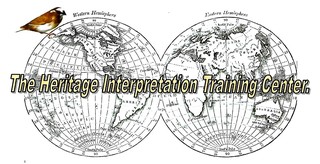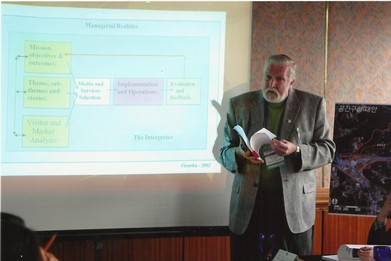John Veverka & Associates
Main menu
- Home Page
- Our Range of Services
- Separator 2
- Interpretive Coaching
- Interpretive Planning
- Interpretive Plan Outline
- Interpretive Training
- John Veverka Resume
- Qualifications
- NEW Advanced Interp. Text Book
- Separator 11
- InterpNEWS
- Separator 12
- Library
- Expert in Interpretation
- JVA NEWS, Courses and Updates
- Certificates
- Separator 47
- Planning/Design of Interpretive Panels
- Separator 48
- Interpretive Writing
- Separator 49
- Interpretive Writing Course
- Separator 50
- Interpretive Trails Course
- Separator 56
- Interpretive Panels Course
- Separator 55
- Introduction to Heritage Interpretation Course
- Separator 54
- Interpretive Planning & Design of Marketing Brochures Course
- Training for Interp. Trainers
- Separator 57
- Interpretive Exhibits Course
- Separator 58
- Interpretive Master Planning Course
- Separator 59
- Interpretive Planning for Scenic Byways.
- Critiquing and Coaching Interpretive Staff
- Separator 31
- Advanced Interpretive Planning
- Interpretive Training Center Course Catalogue
- Separator 32
- Interp. for International Visitors course.
- Separator 33
- Interpretive Exhibits Evaluation
- Separator 34
- Interp. Center Feasibility Analysis Course.
- Separator 35
- Interp. for Commercial Tour Providers
- Separator 36
- Interpretive Researchers Guide for Visitor Studies
- Separator 37
- Separator 13
- Interp. Planning for Historic Homes
- Separator 14
- Heritage Interpretation Training Center
- Interpretive Planning for Botanical Gardens
- Separator 15
- An introduction to planning and presenting live interpretive programs and tours for Museum/Heritage Site Docents and Volunteers.
- Developing Marketing Plans for Heritage & Tourism Sites and Attractions
- Separator 16
- Interpretation Book Store
- Separator 17
- Heritage Interpretation Resource Center
- Interpretive Planning for Historic Farms
- Developing Successful Partnerships
- Developing Interpretive Outreach Programs
- Community Interpretation Planning
- Interpreting Gravestones and Historic Cemeteries
- Using Interpretation to Accomplish Management Objectives.
- An Interpreters Guide for Survival Economics.
- Separator 18
- Innovative Strategies for Interpretive Media and Services Planning.
- Separator 19
- A Curators Guide for Developing Gallery Tours.
- Advanced Interpretive Writing - Technical Publications
- Page 2
- Advanced Interpretive Services for Managers, Supervisors, Team Leaders and Sr. Staff.
- Separator 20
- Advanced Interpretation for Chiefs of Interp. - Interpretive Managers - Regional Interp. Specialists
- Interpreting Critical Issues.
- Separator 21
- Developing Commercial Interpretation for Resorts, Cruise Ships, Campgrounds and Tourism Attractions.
- Separator 38
- Planning and developing a new commercial tour guiding business.
- Separator 39
- Interpretive Evaluation, Visitor Studies and Site Assessment Center
- Separator 40
- The Center for Interpretive Planning Advancement & Excellence.
- Developing Requests for Proposals (RFPs)
- Separator 41
- Planning and Facilitating Focus Workshops
- Separator 42
- InterpNEWS Advertising Details
- Planning for Interpretive Experiences
- 40 Years a Heritage Interpreter
- Separator 43
- Interpretive Techniques - The Rest of the Story Course
- Separator 44
- Certified Professional Interpretive Planner Certificate
- Certified Professional Interpretive Program
- Certified Professional Interpretive Trainer certificate program.
- Separator 53
- Certified Professional Heritage Interpreter certificate program.
- Separator 52
- Certified Professional Interpretive Writer certificate program.
- Visitor motives for attending interpretive programs.
- Separator 45
- Exhibit Rehab Course
- Separator 46
- Developing Training Workbooks & Manuals
- Separator 22
- Planning for Railroad Museums and Sites.
- Separator 51
- Climate Change Interpretation Course.
- Separator 23
- When there's nothing left but the story - interp. storytelling.
- Separator 24
- Interpreting Legends Myths and Fables
- Separator 25
- InterpSHARE - Seminars 2022
- Separator 26
- Interpreting Invasive Species
- Separator 27
- Interpretiing Edible Insects
- Separator 28
- Interpretaive Planning for Climate Change
- Separator 29
- HITC Climate Crisis Resource Center
- Separator 30
- Separator 5
- PUP Members Only
- Starting a new Interp Consulting Business
- Panels 4 Week Course
- Separator 8
- Interpretive Writing - 4 Week Course
- Marketing - 4 Week Course
- Separator 7
- Intro to Interpretation - 4 Week Course
- Separator 9
- Interp Climate Change - 4 Week Course
- Separator 10
- Exhibit Rehab 4-Week Course
- Separator 6
- Level 1
- Johns Interpreters Blog
- Separator 4
- Economics for Heritage Interpreters
Introduction to Heritage Interpretation Course

Introduction to Heritage Interpretation - eLIVE
14 Units - 2 CEU credits.
Are you ready for e-LIVE interpretive training? JVA is pleased to announce the development of the forth of several e-Live interpretive training courses being developed and offered by Professor John Veverka.
This is a University level introductory course to the heritage interpretation profession for any individual finding themselves working in interpretation but having had no formal training in it, or wanting to change careers to heritage interpretation and want a basic understanding of interpretive principles, philosophy, theory and methods. This is the same "introduction to Interpretation" course I taught for several years at Michigan State University, and teach in my residential interpretive training courses today.
Who is this course for:
- Any individual being assigned to an interpretive position with an agency or organization but
have had no formal university level training or courses in heritage interpretation.
- Park, Museum. zoo, botanical garden, heritage site interpretive/education staff.
- Any individual desiring to enter the interpretive profession from some other career profession.
- Museum, park, zoo, historic site docents or volunteers assigned to or interested in interpretive program
delivery tasks.
- Landscape architects, historians, park planners and other professionals occasionally working on
interpretive projects and desire a basic understanding of what interpretation actually is.
- Professionals developing interpretive media who have had no formal training in interpretive
communications design (just because you call it "interpretive" doesn't mean that it is!).
- Professional tour guides desiring to acquire additional public program and tour interpretive
planning and presentation skills.
Course Goals: Upon completion of this course participants will:
- Have a working knowledge of Tilden's Interpretive Principles.
- Have a working knowledge of the Model of Interpretation.
- Will have developed proficiency in:
* Developing and writing interpretive themes.
* Developing and writing interpretive objectives (learn, feel, do).
* Develop skills in understanding how visitors learn and remember in heritage
settings.
* Develop a solid understanding of the interpretive planning process for live/conducted
interpretive walks, tours or programs.
* Acquire practical applications of interpretive program and tour presentation skills.
* Being able to use the interpretive planning model for planning/developing interpretive
media to include: interpretive panels, interpretive exhibits, audio interpretation media,
self-guiding media.
* Basics of interpretive writing.
* Simple techniques for evaluation (self-evaluation) of interpretive programs and
services you present.
About the Instructor: Prof. John Veverka

- B.S and M.S in Heritage Interpretation - The Ohio State University
- Ph.D. program in Interpretation at Michigan State University. Taught introductory and advanced
interpretation courses at MSU for 5 years.
- Adjunct Professor Heritage Interpretation (summer heritage tourism institutes) North Carolina State
University, New York State University.
- NAI Certified Interpretive Planner and Trainer
- NAI Fellow
- Certified Professional Heritage Interpreter (Canada).
- Author of several interpretive planning/training college text books.
- Publisher of InterpNEWS - the International Heritage Interpretation e-Magazine.
- 40 years of interpretive planning, training and writing experience.
How does e-LIVE work? Our e-LIVE courses are limited to 10 participants at one time, to allow for maximum interaction with the course instructor. Once one participant completes the course another participant can be added.
As part of the course you will receive e-book copies of John's college textbook Two Volume Set:
*Interpretive Master Planning - Strategies for the New Millennium
* Interpretive Master Planning - Philosophy, Theory and Practice.
- You'll also given course content materials to read and interact with for each unit.
- JVA will provide you with other additional readings, text books and articles as part of the course.
- You'll be given a writing assignment for each unit which you'll send to John for review, comments and coaching. You'll be able to talk with John about each assignment via SKYPE, or by e-mail or phone. Thus the e-LIVE opportunity. John will be your instructor and interpretive coach who you can talk with at any time about your assignments and your personal goals.
- When you've completed each course unit you'll be sent the next unit for the course. Again, you'll be given new assignments for that unit to submit to John for review, comments and coaching if needed.
- When you've completed the 13 course Units you'll be awarded a Certificate of Completion and 2 CEU (Continuing Education Unit) credits.
The estimated completion time of the course is about 20 hours - and you can work at your own pace.
The Introduction to Heritage Interpretation Course Units Include:
Unit 1 - How visitors learn and remember in a recreational learning environment.
Unit 2 - Ten Learning Concepts interpreters need to know, understand and relate to.
Unit 3 - Definitions, Theories and Objectives of Interpretation.
Unit 4 - What makes the communication process "Interpretive" - a review of Tilden's Interpretive
Principles.
Unit 5 - The model of interpretive communications (we use it for planning any/all interpretive programs, services or activities).
Unit 6 - Developing interpretive program/services and media objectives.
Unit 7 - Story analysis and developing interpretive themes.
Unit 8 - Understanding your visitors - who are they, what do they hope to gain from your program or interpretive services? Maslow's Hierarchy of Needs. Developing a quick visitor profile and analysis.
Unit 9 - Interpretive media options to consider for your program/activity delivery.
Unit 10 - Visitor motivations for selecting and attending interpretive programs - interpretive
research review
Unit 11 - Live Interpretive Program/tour delivery planning: Developing your interpretive
program planning form and check list. Introductions, body and conclusions.
Unit 12 - Using tangibles, intangibles and universal concepts in your interpretive presentation
to better relate to your visitors.
Unit 13 - Self evaluation check list. How do you know you accomplished your objectives?
Unit 14 - what's next - professional organizations, conferences, books and courses. What's your game plan for using the knowledge and skills you gained in this course to keep learning more, and sharing your skills with others?
This Course is ready to go. . You'll be able to pay for the course below
via credit card or Pay Pal. You can also pay by check.
Cost for the 20 hours training with live interaction with the instructor is $150.00 USD.
If you're interested in this course and would like to enroll in it - send an e-mail to John at: jvainterp@aol.com. Then you can return to this web site page to pay for the course using the BUY NOW button below.
Feel free to contact John if you have any questions at all.
Contact John at:
jvainterp@aol.com
Skype: jvainterp
This Buy Now Button is for all individuals registrating for this course
(not for Docents or Volunteers - see below).
This Buy Now button is for Docents and Volunteers working
for Museums, Parks, Heritage Sites Donating their time
to their organizations.
Documentation via registration form is required.